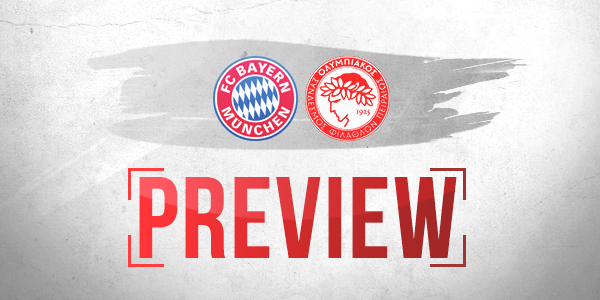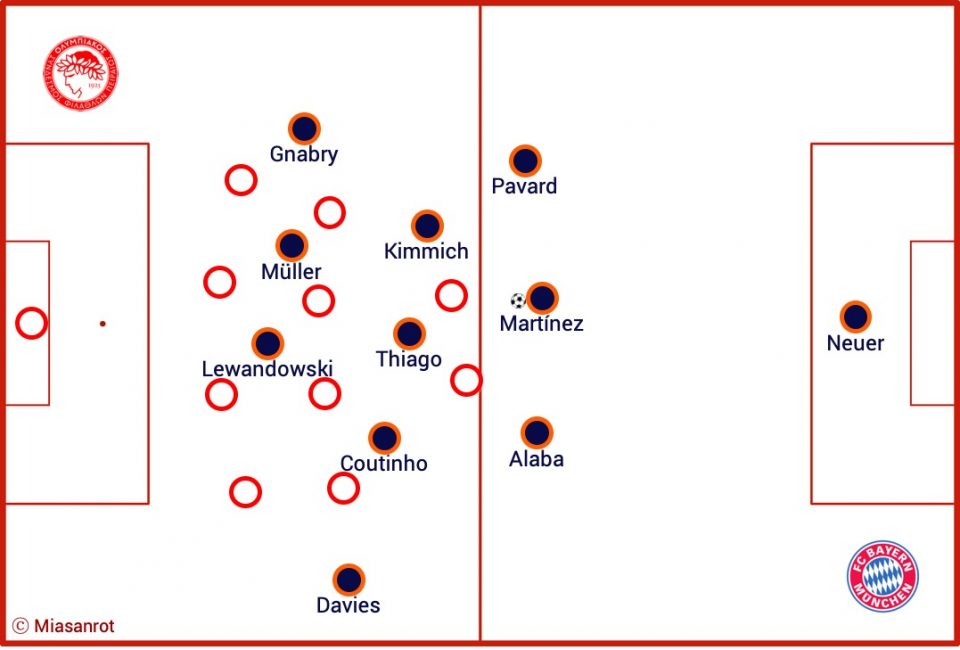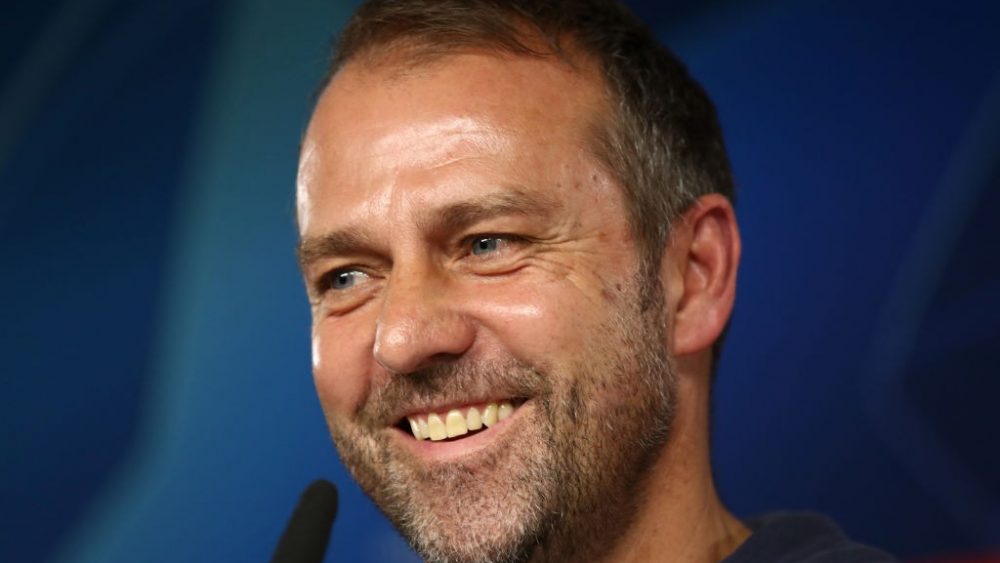Champions League Matchday preview: Flick’s reboot against Piraeus
“I’m not one to live in the past or the future. The present is crucial for me,” said Hans-Dieter Flick at his first press conference as head coach of FC Bayern Munich. He thus set the course for this important week: It’s all about ending the downward trend and winning the home games against Olympiakos Piraeus and Borussia Dortmund.
Flick made a confident impression on Tuesday afternoon. But when he became more emotional at one point and talked about Niko and Robert Kovač, his smart watch suddenly turned on. “I’m not sure if I understood that,” said Siri, Apple’s language assistant, clearly audible to everyone in the room. The interim coach smiled the incident away and asked if anyone had said “Hey Siri!”.
He seemed relaxed, but was also noticeably full of anticipation. Since 2005 Flick hadn’t worked as head coach anymore. Now he has to steer FC Bayern successfully through these complicated days. With his open and honest manner he seems to have won the hearts of the players already during his time as assistant coach. He had many individual conversations with Renato Sanches before his transfer and the picture with the crying Javier Martínez, who Flick embraced and consoled, stayed in many minds. “He’s a top guy,” Joshua Kimmich added on Tuesday.

Bringing back the lust
Flick not only radiated a good mood in the media room. In the social networks too many Bayern fans were optimistic and sometimes even euphoric. Because the 54 year old hit exactly the right notes. He spoke about the fact that the team was responsible now and that there were no excuses any more. In addition, he gave an almost surprisingly accurate account of some of the tactical weaknesses of recent weeks.
The passive defensive work had not been “Bayern like” and he wanted his team to become more active again in the upcoming games. He demanded a higher intensity and a better attitude as well as the will to recover the ball as fast as possible. It was about defending with a view to going forward and strengthening the possession game.
But Flick expressed all this without directly criticizing his predecessor. For the Kovač brothers he found only warm words. All in all, Flick’s was a complete appearance, which gave a first impression of how Flick ticks. If he can transfer only a part of the euphoria he has caused among many fans to the players, this would be an important first step. Because that’s what it’s all about first: The players have to believe in themselves and in the coach’s idea again in order to develop the necessary desire and greed. Building on this, Flick can then try to make initial tactical adjustments.
What can Flick change in such a short time?
In this respect, his response to a journalist’s statement that no tactical changes could be made in such a short time was also interesting. Flick said that he had also trained tactically and that he would change the direction a bit. Whether such changes would only concern the personnel or also the formation as well as some procedures in the game he did not say.
In principle, it is clear that he cannot completely change the team’s game within one week. But the press conference indicated that he knows the weak points. He can point this out in the many conversations he now wants to have with the players.
In Bayern’s positional game he can also change small things by adjusting the basic structure or giving the players the chance to be more compact in possession of the ball. That won’t lead to Bayern suddenly appearing as they did in 2016 in the second leg against Atlético Madrid. But it could stabilize their own game. And that will be important against Olympiacos. The Greeks are known to be very compact in their 4-4-2 (in the first leg it was even a 4-5-1 because Mathieu Valbuena did not play). It will be a matter of getting between the opponent’s lines, balancing the risk and quickly regaining the ball in gegenpressing in order not to run into counter-attacks.
More asymmetry?
For this, Flick could use a tactical tool that his long-time partner Joachim Löw frequently uses: Asymmetry. Especially in offense, Bayern’s game has seemed very predictable lately. For example, with Philippe Coutinho on the left wing, Flick would have the option to provide more depth and moments of surprise in the left half space. Löw has already used many players in this role who resemble Coutinho’s abilities: Mesut Özil and Julian Brandt are just two examples.
Thomas Müller will definitely play. Flick has already revealed as much. Müller, Coutinho and Robert Lewandowski could form a very dangerous triangle without blocking a deeper position. There are still two midfielders left, but they have to push up more to keep the formation compact. Width could also be given by the left defender (David Alaba or Alphonso Davies).
All in all, there would be one speedy dribbler less on the pitch, but Flick would have greater variety, two differently operating wings and a higher presence in the center. On the right, with Gnabry, there would still be someone available who is always able to deliver moments of surprise out of thin air.
It will also be interesting to see what role Flick has planned for Kimmich. At the press conference there was no indication as to whether he would play in the midfield centre or in the right-back position. On the one hand there are no alternatives on the right because Benjamin Pavard is theoretically needed inside. On the other hand, Flick could trust Davies, who has been in good form lately, to use Alaba as a quick centre-back alongside Martínez. Looking ahead to Saturday, Bayern would at least have something to offer against Borussia Dortmund’s quick attacking line. The line-up against Piraeus must also be seen in this context. Flick indicated that he would not change much against BVB. The following line-up could therefore fit well:

But it would also be possible to have a somewhat more symmetrical structure with Kimmich as right-back and Leon Goretzka for Alphonso Davies, for example, whose position will then be taken by Alaba. The structure would be similar, but the focus here would be more on the right wing than on the left half space. Flick will also have to discuss with his coaching team where the weaknesses of Borussia Dortmund lie. Against the speed deficit of Mats Hummels, the focus on the left half space with a subsequent switch to the fast Gnabry might make sense.
Of course, the classic double wing attack also remain an option, playing Kingsley Coman instead of Coutinho or Goretzka. Although the Frenchman has not been in best form lately, he in particular could benefit from a better integration if Flick could solve the problems of the distances.
Faster switches
All in all, Flick has a big advantage compared to Jupp Heynckes in 2017: The team is not as far away from positive beginnings as it was then. At the beginning of the season, it showed several times that it is theoretically capable of creating a powerful and fast combination game with good counter-pressing. Never to perfection, but often with a good foundation.
Flick can build up on this. The main goal will be to achieve faster ball circulation and better protection at the same time. Often Bayern did not manage to unexpectedly switch the play from one area of the field to another and thus create space for themselves.
At the moment Flick can only mention these problems to the team and possibly show them using some video clips. But with that he can already help the team. It will be exciting to see which team he sends onto the field, how visible his announced changes are and if there is any progress at all. Because one thing is also clear: expectations should not be too high after such a short time. Much will depend on whether his players understand him better than Siri.
You can find a detailed opponent preview of Olympiacos Piraeus here.









